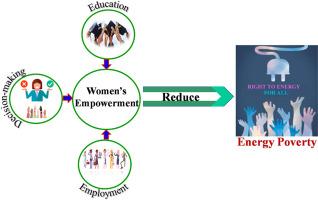Empowering women to combat energy poverty in South Asia
IF 9.4
1区 工程技术
Q1 ENERGY & FUELS
引用次数: 0
Abstract
Energy poverty remains a persistent challenge in South Asia, particularly among rural populations, however limited attention has been given to the role of women's empowerment in mitigating this issue. This study addresses this research gap by introducing a novel Multidimensional Women's Empowerment Index (MWEI) and investigating the relationship with multidimensional energy poverty across five South Asian countries. Utilizing nationally representative Demographic and Health Survey data from 2001 to 2018, we apply mixed-effects logistic regression and a two-stage least squares (2SLS) estimation to control for potential endogeneity and unobserved heterogeneity. The results revealed that higher levels of women's empowerment, defined through their participation in household decision-making, education, and employment, are significantly associated with reduced household energy poverty. Notably, countries such as India, Nepal, and Pakistan experienced energy poverty reductions of over 70 % in households with high MWEI scores. However, significant urban-rural disparities in energy poverty alleviation persist. This study contributes to the literature by empirically quantifying the causal link between women's empowerment and energy poverty reduction through a novel composite index and robust econometric techniques. The findings underscore the critical need for gender-inclusive energy and development policies, especially in rural areas, to effectively combat energy poverty and support the attainment of the Sustainable Development Goals.

赋予妇女权力以消除南亚的能源贫困
能源贫穷仍然是南亚的一个持久挑战,特别是在农村人口中,但是很少注意到赋予妇女权力在减轻这一问题方面的作用。本研究通过引入新的多维妇女赋权指数(MWEI)和调查五个南亚国家多维能源贫困的关系,解决了这一研究差距。利用2001年至2018年具有全国代表性的人口与健康调查数据,我们应用混合效应逻辑回归和两阶段最小二乘(2SLS)估计来控制潜在的内性和未观察到的异质性。研究结果显示,通过参与家庭决策、教育和就业来定义的更高水平的妇女赋权与减少家庭能源贫困显著相关。值得注意的是,在印度、尼泊尔和巴基斯坦等国,MWEI得分高的家庭能源贫困减少了70%以上。然而,在能源扶贫方面,城乡差距仍然很大。本研究通过一种新的综合指数和稳健的计量经济学技术,实证量化了妇女赋权与能源贫困减少之间的因果关系,从而为文献做出了贡献。报告强调,为有效消除能源贫困和支持实现可持续发展目标,迫切需要制定性别包容的能源和发展政策,特别是在农村地区。
本文章由计算机程序翻译,如有差异,请以英文原文为准。
求助全文
约1分钟内获得全文
求助全文
来源期刊

Energy
工程技术-能源与燃料
CiteScore
15.30
自引率
14.40%
发文量
0
审稿时长
14.2 weeks
期刊介绍:
Energy is a multidisciplinary, international journal that publishes research and analysis in the field of energy engineering. Our aim is to become a leading peer-reviewed platform and a trusted source of information for energy-related topics.
The journal covers a range of areas including mechanical engineering, thermal sciences, and energy analysis. We are particularly interested in research on energy modelling, prediction, integrated energy systems, planning, and management.
Additionally, we welcome papers on energy conservation, efficiency, biomass and bioenergy, renewable energy, electricity supply and demand, energy storage, buildings, and economic and policy issues. These topics should align with our broader multidisciplinary focus.
 求助内容:
求助内容: 应助结果提醒方式:
应助结果提醒方式:


